Menu
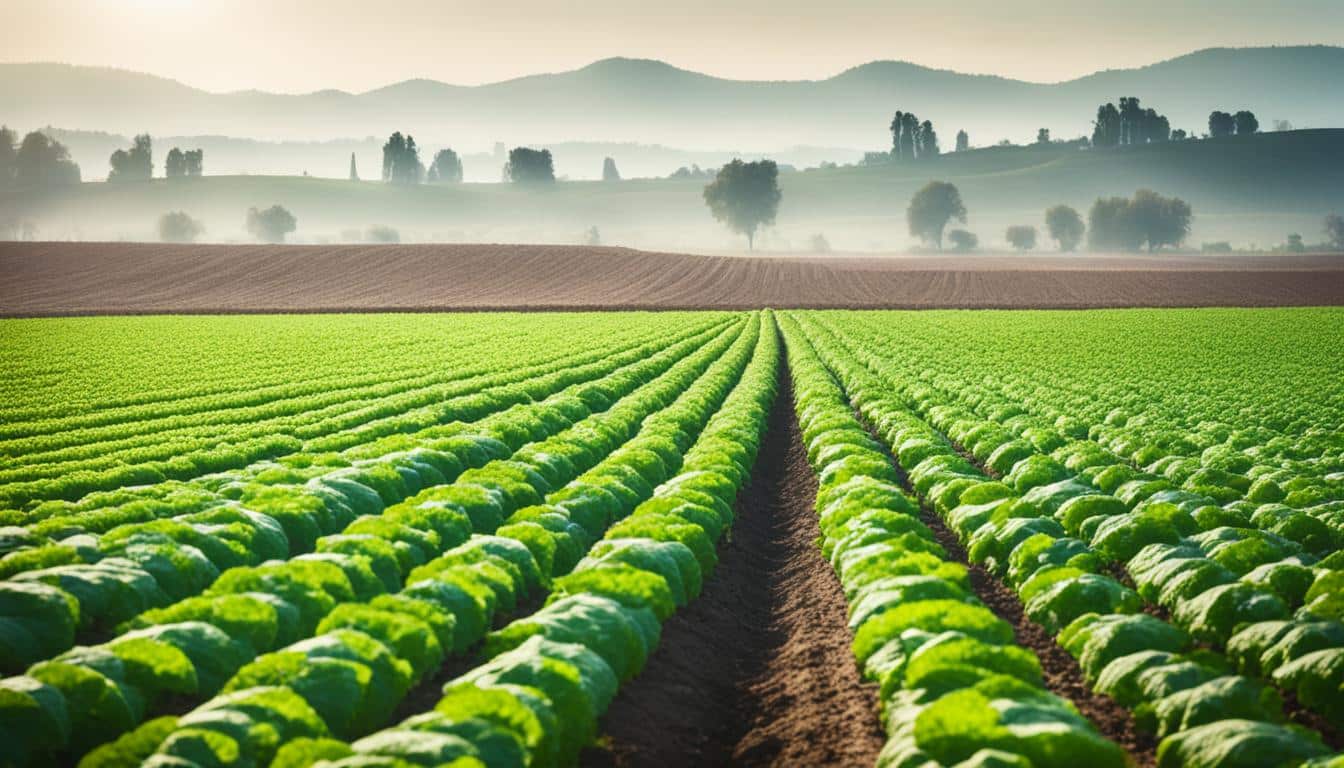
Did you know that, in California, the area used for organic farming increased by 44% from 2014 to 2019? This news comes from the state’s Department of Agriculture. The big rise shows a move towards sustainable food production. The article looks at how organic farming plays a key role in eco-friendly agriculture. It helps lessen the harm from traditional farming on the planet.
Organic farming isn’t just a trend; it’s a real way to help. Studies suggest that if organic systems stop using synthetic nitrogen, they could cut greenhouse gas emissions by 20%. The Rodale Institute’s forty-year research also found that organic farms use 45% less energy. These facts point to the power of organic farming. It can make a big difference in fighting climate change.
Organic produce is leading a big change in farming, especially given climate change. It focuses on farming that’s kind to the planet. This way of farming is fighting the bad effects of our actions on the environment.
Climate change is causing big problems for traditional farming. That’s why more and more people support farming that’s kind to the earth. The USDA and other groups are pushing for farmers to switch to organic ways. They’re even offering money for research to help make farming more able to handle climate changes.
Plus, the government is making it easier for farmers to go organic. They’re giving more money back for getting certified. They’re also offering help and advice to help this transition go smoothly.
Farming plays a big part in the greenhouse gases that hurt the earth. But, there are laws now that want to make farming better for the planet. These laws aim to pay farmers who farm in ways that don’t harm the earth.
Studies show that organic farming is really good for fighting climate change. Organic farms use less energy and put out fewer bad gases. This could lessen the harm we’re causing the planet by a lot. So, switching to organic farming is a big deal in the fight against climate change.
| Initiative | Goal | Benefits |
|---|---|---|
| USDA Annual Investment | Develop climate-resilient crops | Access to regionally adapted breeds |
| Certification Cost-Share Programme | Incentivise organic transition | Smoother farmer transition |
| Agriculture Resilience Act | Achieve net zero carbon emissions | Carbon-positive farming system |
| Climate Stewardship Act | Promote climate-friendly practices | Expanded climate change research |
| Rodale Institute Study | Organic vs. Conventional | 45% less energy consumption |
Research and laws show that farming in a way that helps the planet works. By using better crops and less chemicals, farming can be part of the solution. It can help make our future safer for the earth.
Organic farming is a great way to cut down greenhouse gas emissions. It doesn’t use synthetic nitrogen fertilisers or harmful pesticides. This cuts global agricultural greenhouse gas emissions by about 20%. It also shows a strong commitment to eco-friendly farming.
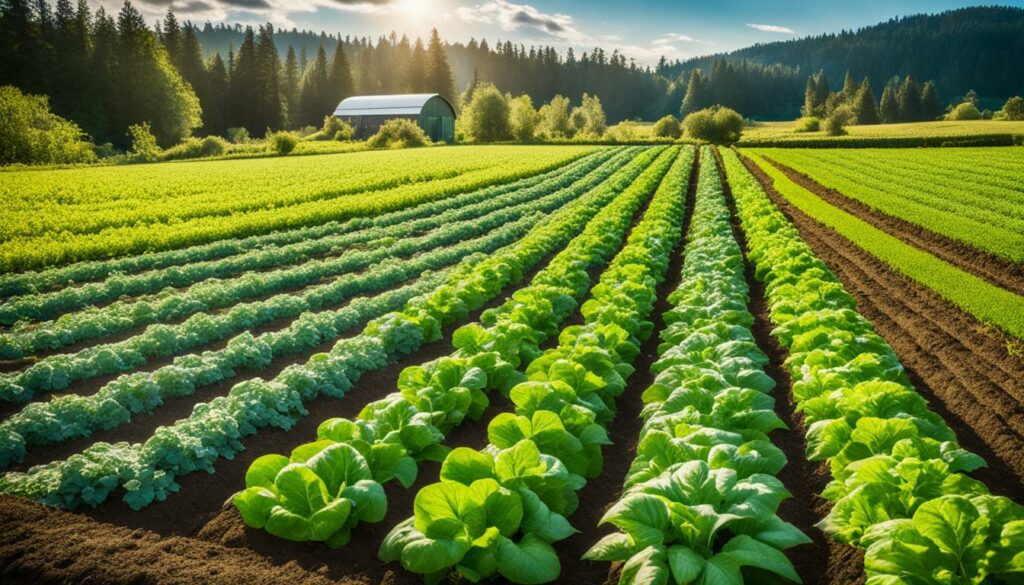
Organic farms use significantly less energy, about 45% less than traditional farms. Less energy means lower greenhouse gas emissions. Thus, organic farming plays a key role in fighting climate change. It also makes the soil healthier, reducing the need for chemical pesticides and fertilisers, which are big emission sources.
Organic farming puts a high value on healthy soil. It helps farms survive the effects of climate change. Techniques like less ploughing, growing different crops together, and using natural materials, increase the soil’s ability to store carbon. This process helps reduce greenhouse gases.
One big plus of organic farming is how it handles pests and diseases. It avoids dangerous pesticides, like Chloropicrin, which can spike N2O emissions. This keeps organic farmers’ carbon footprints small. It also supports a wide variety of plants and animals, which are important for natural pest control and soil health.
Research finds that pesticide use harms over 70% of soil insects and worms. Organic farms protect these tiny creatures by looking after the soil. Healthy soil lets plants’ roots and the soil’s microorganisms thrive. This keeps the soil in place, feeds good bugs, and helps capture carbon from the air.
Looking ahead, if the world follows good organic farming practices, by the year 2100, soil can absorb more carbon than farming emits. This potential is a powerful ally against climate change and points towards a sustainable farming future.
| Benefits | Organic Farming | Conventional Farming |
|---|---|---|
| Energy Usage | 45% Less | Higher |
| Carbon Sequestration | High | Low |
| Soil Health | Emphasised | Often Neglected |
| Pesticide Use | Minimised | High |
| Greenhouse Gas Emissions | Lower | Higher |
Organic produce plays a big part in keeping our planet healthy. It helps the soil trap carbon. The goal set by the California Air Resources Board is to have 20% of California’s farms be organic by 2045. This shows how important organic farming is in the fight against climate change.
Farming organically means using methods that make the soil and environment better. Without synthetic nitrogen fertilisers, the planet’s health improves. Greenhouse gas emissions from farming drop by about 20%. Also, a long study found that organic farming uses less energy over time.
Organic farms don’t use dangerous pesticides like chloropicrin. These can cause huge increases in N2O emissions. They also harm the tiny creatures in the soil that help lock carbon away.
Studies have shown that organic farming is better for the earth. They prove it helps keep carbon in the soil and cuts down on a harmful gas called nitrous oxide. This means a healthier planet for all of us.
Looking at hundreds of studies, experts found that using pesticides in regular farming can hurt the soil. More than 70% of the time, this affects the bugs in the soil that help with carbon storage. This highlights why going organic is so crucial.
Organic farming is more than a method; it’s key to facing climate change. It’s deeply linked to sustainable agriculture. By focusing on soil health, it builds strong defences against climate issues.
By not using synthetic nitrogen, organic farms cut global greenhouse gas emissions by about 20%. This is big because these gases warm our planet. Also, organic farms can store more carbon in the soil. This all lowers our carbon footprint.
A 40-year study by the Rodale Institute found organic farms use 45% less energy. This shows sustainable farming cuts down on energy waste. Organic farms also do 40% better in droughts, proving they’re tough against different weather.
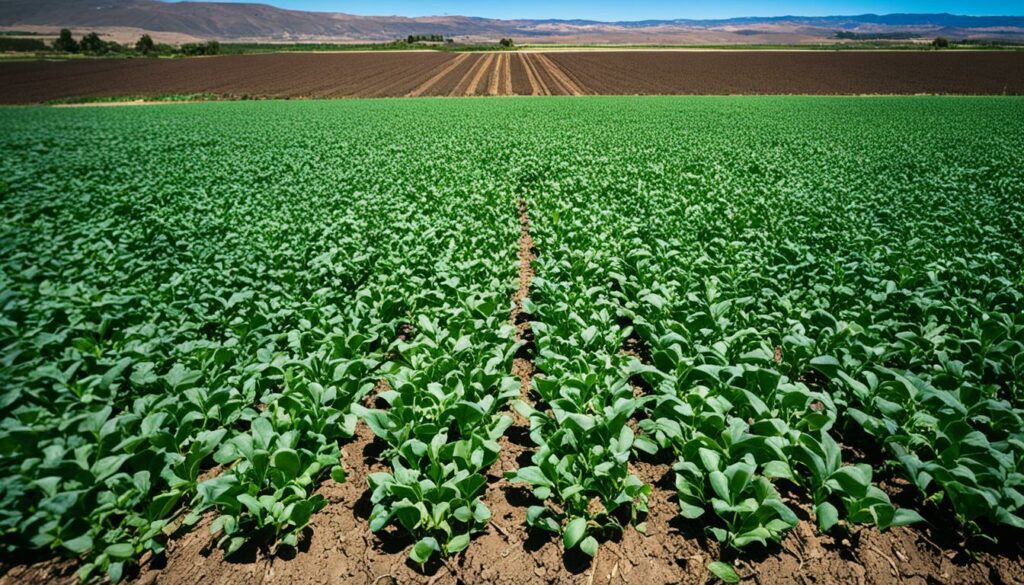
In California, the land farmed organically increased by 44% from 2014 to 2019. Organic farming helps water soak into the ground better by 15-20%. This helps in dry places. The USDA also supports organic methods that keep the soil healthy.
| Practices | Benefits |
|---|---|
| Reduced Tillage | Contributes to soil carbon sequestration |
| Diversified Crops | Improves biodiversity and soil health |
| Cover Cropping | Enhances soil organic matter |
| Agroecological Best Management | Results in soil absorbing more carbon |
Organic farming builds strong roots for crops. This helps against dry times and floods. By protecting the soil and using smart planting, it leads the way for farming that’s good for the planet and our future.
Switching to organic farming needs help from governments. They create public policies to support organic farming. This makes sure that organic agriculture can grow and succeed.
The state of California shows how governments can help. California is using policies to promote organic farming. This is part of its big plan to fight climate change and get both environmental and financial benefits.
The European Union is also making big steps. It has targets to cut down on pesticides and push for more organic farms. This move aims for a better future in farming. It proves how important government support is to grow organic agriculture.
As the climate changes, farmers face new and big problems. These issues affect how well they can grow crops and raise animals. The main problems are extreme weather events and heat stress from wildfires.
Bad weather is happening more often. This includes too much or too little rain, and big storms. It can greatly disturb farming. In fact, during droughts, organic farms can do 40% better in yield than non-organic ones, thanks to their healthier soil. But, even they are at risk.
Farmers need to find ways to deal with this crazy weather. It’s important because bad weather can hurt the crops and the soil.
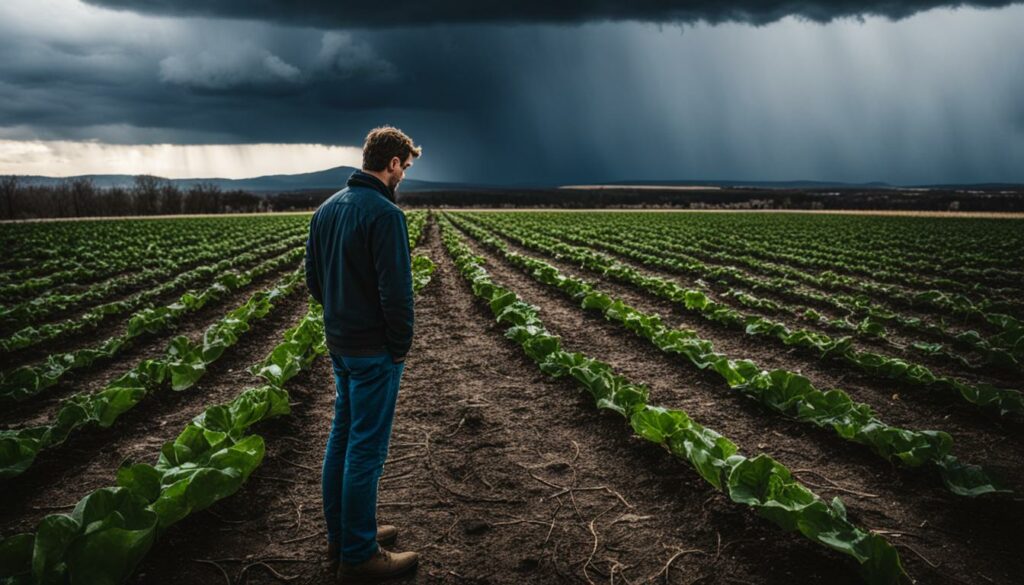
A lot of heat and wildfires are big problems for farmers because of climate change. Crops and animals get very stressed. Wildfires also burn a lot of land. Chemicals used in farming can make things worse by affecting the climate more.
We must find ways to grow crops that can handle the heat better. Also, changing how we grow food can help reduce the risks.
| Challenge | Impact | Adaptation Strategies |
|---|---|---|
| Extreme Weather | Crop Failure, Soil Erosion | Cover Crops, Improved Water Management |
| Heat Stress | Reduced Crop Yields, Livestock Mortality | Heat-Resistant Varieties, Agroforestry |
| Wildfires | Destruction of Farmland, Soil Degradation | Integrated Fire Management, Sustainable Land Use |
Dealing with these climate problems is very important. Using organic farming can help. It’s better for the environment and makes farms stronger. It’s all about making our farms ready for what the future holds.
The organic food industry has seen big growth lately. It’s now a key player in the economy. In 2021, 3.7 million people around the world were making organic food. This shows how important this industry is. The amount of land used for organic farming worldwide is 76 million hectares.
In California, the amount of land for organic farming went up by 44% from 2014 to 2019. This jump is thanks to the state’s strong support for going organic. It helps the environment and boosts the economy, showing how vital sustainable farming is.
Organic food and drink sales globally hit nearly 125 billion euros. The USA is the top spender on organic products with 48.6 billion euros. Then comes Germany with 15.9 billion euros and France with 12.7 billion euros. This shows the big role organic farming plays in the economy.
Many people are choosing to buy organic, with Swiss people spending 425 euros per person. Denmark sells the most organic food compared to its total market. These numbers show a trend towards buying organic, helping the industry grow.
Choosing organic is not just good for us but also for the planet. Research finds that organic farms use 45% less energy than traditional ones. This not only saves money but also makes the food sector more green and profitable.
| Country | Organic Sales (Billion Euros) |
|---|---|
| United States | 48.6 |
| Germany | 15.9 |
| France | 12.7 |
| Switzerland (per Capita) | 425 |
In the end, the organic food boom is all about doing food right. It’s a step towards a future with sustainable, planet-friendly food. The money it makes isn’t just about business. It also means better health and a stronger promise to take care of the Earth.
In 2019, food production processes were behind 31% of carbon dioxide emissions. This makes eco-friendly agriculture very important. It involves using green farming techniques. Farmers who use these methods help reduce harmful emissions. For instance, using crop rotation can lower the need for rare phosphorus fertilisers, which makes the soil healthier.
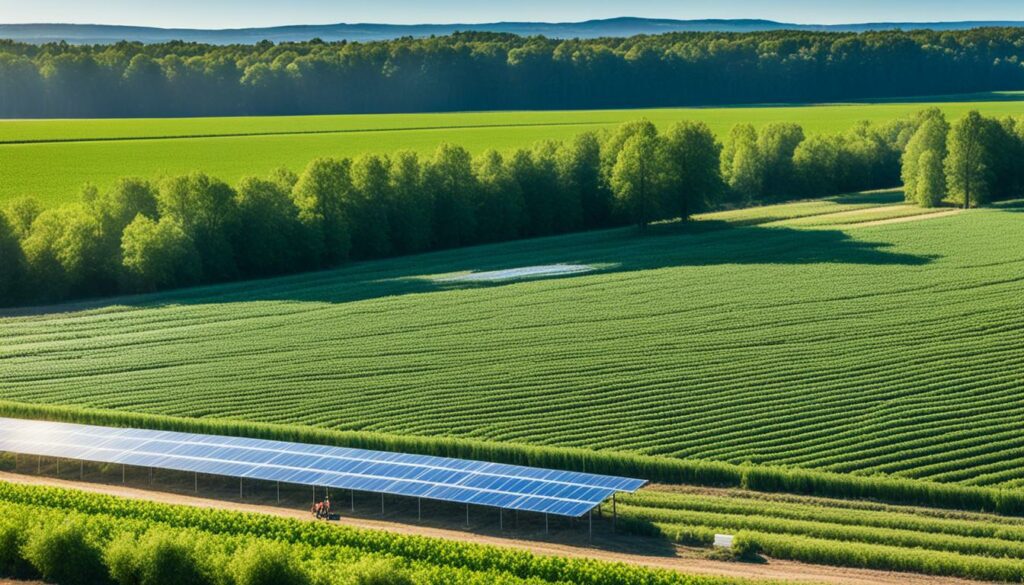
Sustainable farming doesn’t just help the environment, it also boosts profits on the farm. Research shows sustainable farms produce more and make more money. This is especially good for small farmers. They help protect the local environment and make sure there’s enough food for everyone to eat. This includes making food available, easy to get, useful, and steady.
Also, sustainable farming is better at dealing with shortage of resources and bad weather. Methods like precision farming use high-tech sensors to use resources better. This means less pollution and savings for the farmers.
Conservation agriculture and organic farming are also vital. They help the soil, reduce water loss, and keep biodiversity. Practices like avoiding artificial fertilisers and pesticides are key. They protect the soil, clean water, and diverse plants and animals. Other modern ways of farming, like hydroponics and vertical farming, need less space and water.
Projects like Jiva help farmers for free, making their lives better. Since 1980, a lot of farm new land came from cutting down forests. We need to stop this. By choosing eco-friendly agriculture and green farming techniques, we’re making a big step towards a healthier planet.
| Method | Benefits | Impact |
|---|---|---|
| Precision Farming | Optimises resource usage using sensors, GPS, and data analytics | Reduces environmental contamination, increases cost-effectiveness |
| Conservation Agriculture | Minimum soil disturbance, diversified crop rotations | Enhances soil health, reduces erosion, conserves water |
| Organic Farming | Eschews synthetic fertilisers and pesticides | Promotes soil health, water quality, and biodiversity |
| Hydroponics and Vertical Farming | Utilises less land and water | Addresses land and water scarcity |
Today, global worries about the environment are everywhere. So, focusing on local food sustainability is really important, not just a fad. It means bringing food from nearby farms to our plates. This helps a lot in reducing the carbon footprint and makes our communities stronger.
Food often travels over 1,000 miles to get to shops. On the other hand, food at farmers markets comes from closer, maybe within 200 miles. Some is even grown within just 50 miles. Choosing local food means our food only moves a fraction of the distance compared to usual. This makes it much fresher and is a big move for the environment.
| Metric | Farmers Markets | Retail Stores |
|---|---|---|
| Average Distance Food Travels | Up to 200 miles | Over 1,000 miles |
| Price Comparisons | Lower (excluding potatoes) | Higher |
| Organic Practices | Half of products organic | Varies |
Focusing on local food sustainability means working together in our communities. At farmers markets, nearly half of what’s sold is organically labelled. The fruits, vegetables, and animal products there meet high organic standards. Farms also pay close attention to managing pests and keeping the soil healthy. This effort provides us with fresh, healthy food and supports our local economy.
Getting food from local farms is key for tackling carbon footprint reduction. It also helps address growing food shortage worries worldwide. Supporting local food sources means we’re working towards a future full of sustainable practices and community support.
Organic agriculture is gaining more and more fans. However, many people have the wrong idea about it. It’s vital to clear up these misconceptions. A big myth is that organic farming doesn’t use pesticides. In truth, it avoids synthetic ones but allows natural pesticides. These come from plants, insects, or minerals and are less harmful.
Some think organic farming is always better for the planet. It’s true it aims to have less environmental impact and care for the soil and wildlife. But, it needs more land to grow the same amount of food as non-organic methods. For example, organic foods made from plants might need up to 20% more land. Meat like beef, pork, and poultry needs even more extra space.
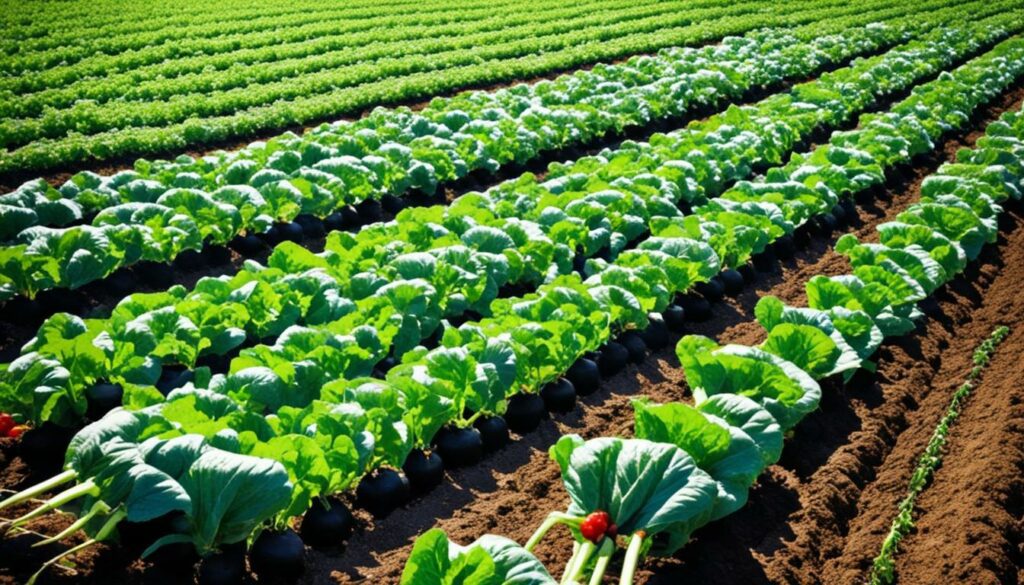
The United States, being big in farming, uses a lot of land. Needing more land for organic farming could add to deforestation. It might also take away habitats from wildlife. So, we need to think carefully about how we use land wisely.
Many believe organic food is always healthier. Some studies show a little more nutrients in organic items. But, this depends on the crop and other factors, making the difference small and not always there. So, the health boost from organic food might not be huge.
People often pay more for organic stuff because they think it’s better for the planet and health. Those with more money and who buy organic a lot are more likely to believe this. But, many people don’t really understand what organic means. They might think all organic food is healthier or that it’s the same as local produce.
Others wrongly believe organic farming doesn’t add to greenhouse gas emissions. It’s true it uses less synthetic nitrogen, which helps cut some emissions. But all of U.S. farming still puts out a lot of greenhouse gases, about 10%. Since 1990, the gases from managing manure have actually gone up by 66%. This is mostly because of large-scale farming practices.
“Factory farming and conventional agriculture sectors result in higher emissions due to extensive fertilisation and unsustainable manure management practices.”
But there’s hope in “regenerative” farming. This method includes planting different crops and using cover crops. It’s good for the water, wildlife, and helps reduce the bad effects of farming. This approach matches the true goals of organic farming, showing the value of a system of caring for the environment well.
Getting rid of misconceptions is key to helping people make smart choices. We need to know the actual pros and cons of organic farming. With this knowledge, we can support a healthier and more sustainable food industry.
| Misconceptions | Organic Farming Truths |
|---|---|
| Organic farming uses no pesticides | Permits natural pesticides derived from plants, insects, or minerals |
| Always better for the environment | Requires more land, potentially leading to habitat loss |
| Organic foods are always healthier | Nutritional differences are minimal and crop-specific |
| Organic farming has no impact on emissions | Contributes 10% of U.S. greenhouse gas emissions |
Organic farming is leading the way in agriculture, especially with climate-resilient crops. These crops are key in a time of increasing temperatures and severe weather. They help combat challenges like droughts, heat waves, and storms.
In organic systems, more carbon is captured and stored in the soil. This happens through methods that enhance carbon sequestration. Healthy soil structure also means better moisture retention, less need for irrigation, and reduced risks of runoff and erosion.
Organic methods like less tillage and crop diversity help sequester more carbon. These practices maintain soil health and increase nutrients available to crops. Keeping soil covered with crops even after the main season prevents erosion and keeps the topsoil healthy.
Plant roots play a big part in supporting soil health and increasing carbon trapping. In California, for example, organic farming’s growth of 44% in five years shows their importance. Also, cutting out synthetic nitrogen fertilisers could reduce greenhouse gas emissions from farming by 20%.
When it comes to energy, organic farming is a clear winner over conventional methods. A study showed organic farms can be 45% more energy efficient. Conventional pesticides might harm the environment, with substances like chloropicrin potentially causing a big spike in harmful emissions. Diversified organic farming practices globally could see soil getting rid of more carbon than the farming sector adds up until 2100.
Organic farming also betters water percolation, increasing groundwater and helping crops survive droughts and floods. During dry spells, organic yields can be 40% better than non-organic. The European Union and California are aiming for more organic farming to combat climate change.
In conclusion, organic farming with climate-resilient crops is a smart natural solution to climate change. It shows the creativity and resilience of sustainable farming.
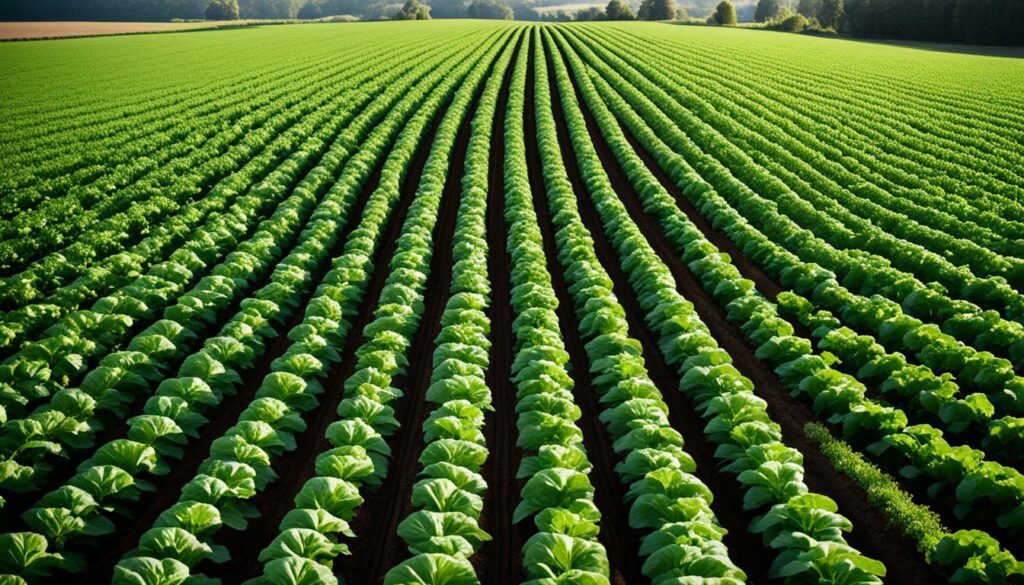
Green farming stands as a key part of making food more sustainably. It helps cut down on harm to our environment and boosts ecological health. By using these methods, we lessen the bad effects of usual farming ways.
An important benefit is that it uses much less energy. Studies show organic farms need 45% less energy than others, without losing on the amount grown. It’s great for the planet and can even cut down on harmful gases by 20%.
Focusing on soil health is a big part of green farming. Techniques like rotating crops and managing nutrients make the soil better. Better soil can hold more water, which helps a lot when there’s too much or too little rain.
These methods also decrease harm from pesticides. Research found over 70% of studies showed pesticides hurting soil bugs that help lock away carbon. Using more plants and animals and less chemicals is better for the whole ecosystem.
In California, there’s a big rise in using these green farming ideas. From 2014 to 2019, the amount of organic land there increased by 44%. This shows the real advantages of green farming for our planet and our wallets.
In a world where it’s getting hotter and there are more natural disasters, these techniques are crucial. Organic farming helps keep more carbon in the ground. This is very important in fighting climate change and ensuring we have enough food in the future.
To sum up, green farming is a real and workable way to farm better. It keeps the environment in mind and makes sure we can keep producing food for a long time. It’s about working with nature, not against it.
| Benefit | Organic Farming | Conventional Farming |
|---|---|---|
| Energy Use | 45% less | Higher |
| GHG Emissions | 20% Lower | High |
| Water Percolation | 15-20% Improvement | Standard |
| Soil Health | Enhanced | Often Degraded |
Public policy is key to a healthy future in farming. Governments that support organic farming allow us to enjoy its many benefits. The Opportunities in Organic Act highlights the need to invest in this field, pointing to its economic growth potential.
This act boosts funding for farmers moving towards organic methods. It aims to make the shift easier and more beneficial for many in agriculture. With this support, we expect to see more eco-friendly farming and economic growth in the organic sector.
Support from the government is vital for the organic industry’s growth. California shows how well-placed policy can increase organic farming by 44%. States like Wisconsin and Iowa have seen thousands of organic farms, which has greatly helped their local economies.
These investments help in various ways. They make organic farms more efficient and less energy-dependent. This is good for the environment, and it plays a part in fighting the climate crisis by reducing the need for harmful farming inputs.
| State | Organic Operations |
|---|---|
| Wisconsin | 2,000 |
| Iowa | 1,000+ |
| Ohio | 1,000+ |
| Minnesota | 700+ |
| Indiana | 700+ |
| Michigan | 700+ |
| Texas | 700+ |
| Illinois | 700+ |
Encouraging strong public policy for organic farming is crucial. It leads to sustainable growth and strengthens the organic sector economically. With the right backing, organic agriculture will flourish, offering big environmental merits and ensuring strong food systems for years to come.
Organic farming and pollinators go hand in hand, helping both crops and nature. This method avoids harmful pesticides, making things safer for these vital creatures.
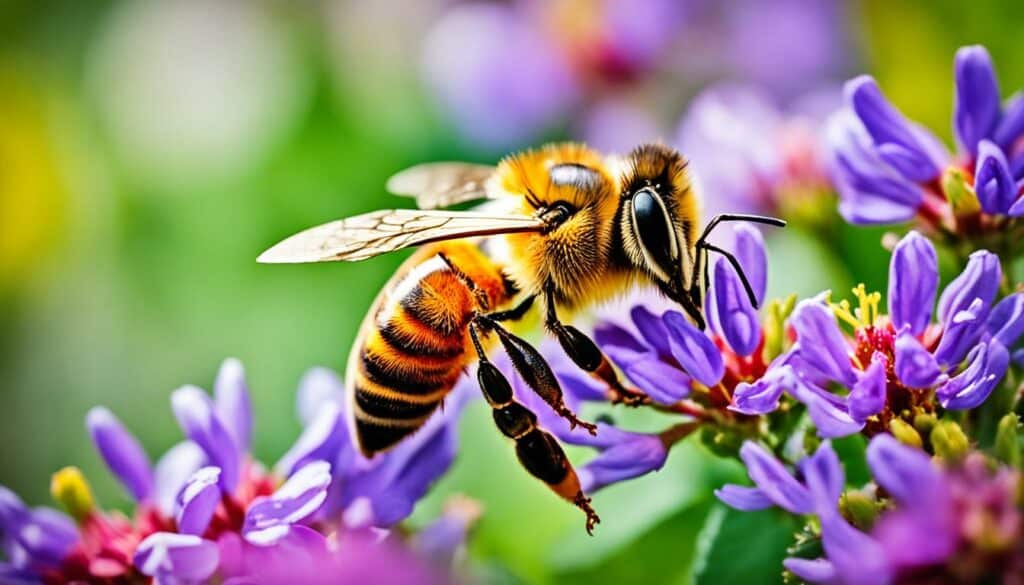
Beekeepers have lost many beehives over the last ten years, showing we must keep pollinators safe. Just honeybees contribute $12.4 billion to crops each year. They’re key in our food system, with pollinators playing a huge part in crops worth $190 billion worldwide.
Organic farming doesn’t just help crops; it supports pollinators and the environment too. This method is about more than just food; it’s creating a space for pollinators to live well. This keeps crucial crops growing strong.
| Statistics | Value |
|---|---|
| Bee Hives Lost | Over one third in the last decade |
| Crops Value by Honeybees | $12.4 billion annually |
| Global Pollination Services | $190 billion worldwide |
| Crops Dependent on Pollinators | 75% for human consumption |
Switching to organic farming has many benefits. It helps pollinator health, maintains the balance in our ecosystems, and improves food security globally.
My dive into organic produce’s influence on climate change ends hopefully. More and more people are willing to pay extra for organic, showing a shift towards supporting green farming methods.
Clark and Tilman’s work looked at 742 farming systems and 90 foods. They found that organic farming uses less energy, except in growing vegetables. Even though it can create more acid and eutrophication, it helps cut down on greenhouse gases, especially with certain organic crops.
Climate change is hitting the most vulnerable hard. It’s affecting low-income people, those from different backgrounds and cultures, the young, the old, and the sick. Changing our ways in energy, transport, housing, and food is key.
We need big changes in our policies and structures, along with better disaster responses. Helping the vulnerable get stronger and have more say is critical. We must act right now to protect our future and our planet. Organic farming symbolises our fight against climate change and hope for a better tomorrow.
Organic farming uses methods that are kind to the environment. It avoids harmful pesticides and fake fertilisers. This approach helps our food system be more sustainable and lets the earth stay healthy.
Agriculture is a big reason for climate change. It puts out greenhouse gases from chemicals and livestock. Changing to better farming ways and plants can help reduce the harm and keep farming sustainable.
By keeping away from bad chemicals, organic farms cut down on gases that cause climate change. This way, they make the air cleaner. Organic farming proves we can grow food without hurting the planet.
Organic farming uses natural ways to care for the soil. It stores more carbon and lowers bad gas emissions. This is better for the earth and helps fight climate change.
Organic farms have strong, healthy soil and plants. This helps them fight off extreme weather and keep going. These farms are like a shield against bad weather effects.
Governments can help by making laws and supporting organic farming. They can take action like the measures in California and the EU. These steps show that organic farming is key to stopping climate change.
Farmers deal with more extreme weather, heat, and fires. These threats are hard to predict. But, by using new farming methods, they can keep on growing food under tough conditions.
The organic food industry is growing fast. People like its healthy and eco-friendly values. This boost is good for both local and worldwide economies.
Sustainable farming is vital for our future. It focuses on being environmentally friendly and making food in a way that lasts. These methods keep our planet’s balance and ensure we can keep growing food.
Buying local food cuts down on pollution. It also helps local communities and the planet. By buying and growing food nearby, we support our economy and protect our planet.
Some people think organic farming isn’t very productive or that its food isn’t better for you. But research shows that organic farming is great for our health and planet. It’s the smart choice for everyone.
Organic farmers grow plants that can handle climate changes naturally. These sturdy crops are a key part of organic farming. They help farming be both long-lasting and good for the earth.
Green farming includes crop rotation, composting, and not digging too much. These eco-friendly methods make our food system stronger and better for the environment.
Public rules and funding can make farming better for the earth. For example, The Opportunities in Organic Act is all about helping the organic sector grow. It shows how public money can pave the way for a better future in farming.
Organic farming is good for insects because it doesn’t use nasty chemicals. It helps bees and other pollinators live and do their job. This is key for growing crops and keeping our food supply healthy.